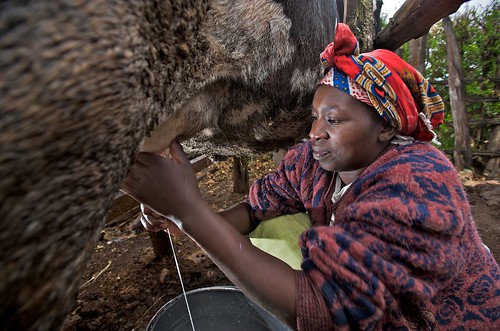A dairy farmer milks a cow in Kenya’s Nyandarua district. Kenyan small-scale dairy farmers are benefitting from the dairy policy changes that began in 2004. (Photo credit: East African Dairy Development Project)
Recent findings from an assessment of the impacts of the Kenya dairy policy change of September 2004 show that changes in the sector, which incorporated small-scale milk producers and traders into the milk value chain and liberalised informal milk markets, have led to an increase in the amount of milk marketed, increased licensing of milk vendors and an increased demand for milk leading to benefits of US$230 million for Kenyan milk producers, vendors and consumers over the past 10 years (US$33 million per year).
The study, conducted between August 2007 and January 2008 among milk producers, vendors and dairy farmers in Nairobi, Nakuru, Thika and Kiambu towns, shows there was a threefold increase in marketed milk in all the towns with Nairobi recording a fourfold increase between 2004 and 2008. The findings also show that overall, ‘small-scale dairy operators have profited from quick, relatively high volume turnovers and welfare benefits to small-scale vendors have increased,’ since the introduction of the new policies in Kenya’s dairy industry.
According to the study ‘allowing licenced small-scale milk vendors to operate leads to increased milk supply to the retail market’ and it also found a continual increase in the number of small-scale milk vendors acquiring licences since 2004 to run milk bars to meet the increased demand for milk.
The study’s findings show that in Nairobi, the highest profits were gained by non-producer mobile traders, followed by milk bars and mobile transporters while in Nakuru those who benefited the most were producer mobile traders. The study, however, notes that the changes in policy also led to a decrease in market margins for retailers with an average 9% reduction across the surveyed towns. Milk traders in Nairobi experienced a reduction of Ksh 0.80 (US$0.012) per litre of milk sold.
With nearly 800,000 Kenyan smallholder households depending on dairying for their livelihoods and the dairy sector providing employment to over 350,000 people in milk collection, transportation, processing and sales; the dairy industry plays an important role in meeting the livelihood needs of poor Kenyan households as well as in contributing to Kenya’s economic development.
The study ‘Kenyan dairy policy change: influence pathways and economic impacts,’ was carried out by Amos Omore, a scientist with the International Livestock Research Institute (ILRI), among others researchers from Qatar University, Norwegian Institute of International Affairs and the World Agroforestry Centre (ICRAF). It assessed the impact of the Smallholder Dairy Project (SDP) and its contribution to the revised Kenya dairy policy and looked at the behavioural changes among field regulators and small-scale milk vendors resulting from recognition of their role in the milk value chain. The study also estimated the economic impact of the policy on producers, vendor and consumers.
Among the study’s other findings is that as a result of the new policies, milk handlers across the country are better trained, ‘with 85% reporting they had been trained on milk handling and quality control methods’ and that it is now much easier for producers and vendors to acquire licenses for their operations. Training and licensing is carried out by the Kenya Dairy Board and the Public Health Department who are now ensuring that licensed outlets and premises, especially those run by small-scale milk vendors, meet all hygiene, testing, sanitation and health requirements for milk handling. They also assist the milk vendors to meet these condition and this change in approach means that nearly all producers and traders understand the requirements of milk handling and quality control.
Kenya has made significant progress in liberalizing its dairy industry and is working towards training and licensing more small-scale milk vendors to allow them to fully engage in the formal milk sector. As a result of these experiences, the study says, there has been ‘behavioural changes among regulators and small-scale milk vendors that has led to positive economic benefits across Kenya.’
—
To read the complete report and its findings, visit http://dx.doi.org/10.1016/j.worlddev.2010.06.008
The Smallholder Dairy Project which started in 1997 and ended in August 2005 was implemented by ILRI, Kenya Agricultural Research Institute and the Kenya Ministry of Livestock and Fisheries Development. It was funded by the UK Department for International Development. To read more about the project and its achievements, visit http://www.smallholderdairy.org/default.htm


give the latest on TMR for small scale farmer ( with 4 dairy cows) or a start